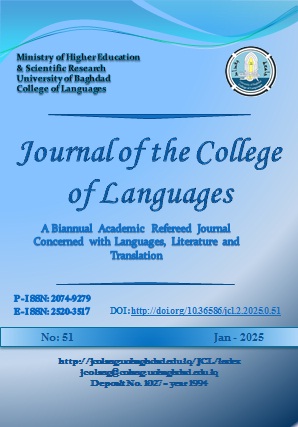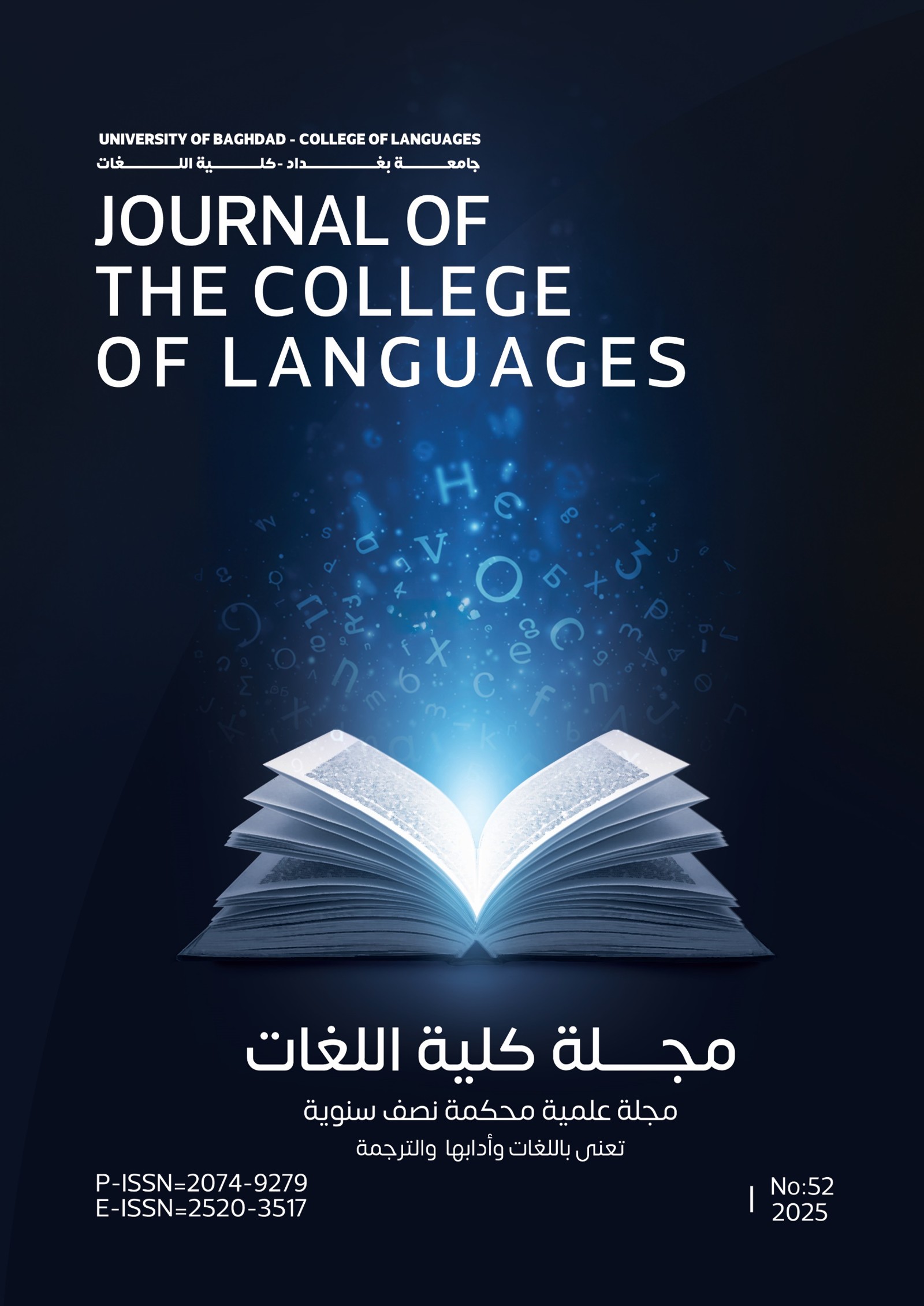Stlye and Ideology in Jonathan's No Enemies to Fight - Gooluck Jonathan on the Mable
DOI:
https://doi.org/10.36586/jcl.2.2025.0.51.0001Keywords:
Deixes, ideology, Goodluck Jonathan, style, Systemic Functional LinguisticsAbstract
Linguistic researches on stylistic or ideological investigation of political speeches are in high but separate volumes leaving a gap in stylo-ideological analysis. This paper investigated style and ideology in No Enemies to Fight: Goodluck Jonathan on the Mable, a compendium of quotable quotes from the former Nigerian President Goodluck Jonathan's speeches. Reading through, prominent linguistic features that project the writer's ideologies were identified, and then analyzed quantitatively and qualitatively, employing the theoretical framework of Halliday's Systemic Functional Linguistics. Jonathan deployed simple syntactic structures, inclusive person deixes and lexical reiterations to advance personal and political ideologies founded on honesty, humility, fairness, forgiveness, friendship, openess, prudence and respect for the rule of law.These held beliefs earned him the desired public acceptance and support. The research has not only unraveled Jonathan's ideologies; it has also thrown lights on the deployment of stylistics for espousing ideological positions in political speeches.
References
Akinkuolere, S. O. (2011). “A speech act analysis of selected political speeches of President Umaru Musa Yar’Adua”. An unpublished M. A. Thesis of Department of English, Obafemi Awolowo University, Ile-Ife.
Aiyeomoni, M. O. (2012). “A pragmatic analysis of victory and inaugural speeches of President Umaru Musa Yar’Adua”. Theory and practice in language studies. Vo. 2. No 3. Pp 461 – 468.
Berry, M. (1975). Introduction to systemic linguistic structures and systems. New York: St Martin.
Chilton, P. and Schaffner, C. (1997). “Discourse Pragmatics”. In Van Dijk. T (ed) Discourse as social interaction. London: Sage.
Eagleton, T. (1991). Ideology: An introduction. London: Verso.
Foucault, M. (1972). The archeology of knowledge and the discourse on language. New York: Pantheon Books.
Halliday, M. A. K. (1979). “Modes of meaning and modes of expression: Types of grammatical structure and their determination by different semantic functions”. In Function and context in linguistic analysis. Alberton, D. J., Carney, E, and Holdcroft, D (ed.). Cambridge: Cambridge University Press. Pp 57 – 79.
Halliday, M. A. K. (1985). An introduction to functional grammar. 2nd edition. London: Edward Arnold.
Halliday, M. A. K. (2002). “How do you mean?”In. On language and linguistics. Vol. 3 in the collected works of M. A. K. Halliday, ed. Jonathan Webster, 352 – 368. London and New York: Continuum.
Halliday, M. A. K. (2003a). “Language and the order of nature”. In On language and linguistics. Vol. 3 in the collected works of M. A. K. Halliday, ed. Jonathan Webster, 116 – 138. London and New York: Continuum.
Halliday, M. A. K. (2003c). “A recent view of misstep in linguistic theory” (Review article of John M. Ellis. Language thought and logic). In On language and linguistics. Vol. 3 in the collected works of M. A. K. Halliday, ed. Jonathan Webster, 232 – 247. London and New York: Continuum.
Hasan, R. (2005a). “Code, register and dialect”. In Language, society and consciousness. Vol. 1 of the collected works of Ruqaiya Hasan, ed. Jonathan Webster, 160 – 193. London and Oakville: Equinox.
Holman, C. H. (1980). A handbook to literature. Indianapolis: Bobbs Merrill Edu. Publishers.
Leech, G. N. and Short, M. (1983). Style in fiction. London: Longman.
Lucas, F. l. (1955). Style. London: Cassell & Company.
Lukin, A (2017). Ideology and the text-in-context relation. Functional Linguistics. 4, 16.
Maiyanga, A. A. (1990). “A semantic and pragmatic analysis of selected speeches of Nigerian headsof State”. An unpublished M. Phil Dissertation of the Department of English, University of Ibadan, Ibadan.
McLellan, D. (1986). Ideology: Concepts in the social sciences. Open University Press.
Minar, D. W. (1961). “Ideology and Political Behaviour.” Midwest Journal of Political
Science 5(4): 317-31.
Nnoli, O. (2003). Introduction to politics. Pan- African Centre for research on peace and conflict resolution. Pp 177 – 178.
Norgard, N., Busse, B., and Montoro, R. (2010). Key terms in stylistics. London and New York: Continnum International Publishing Group.
James, P. and Manfred, S. (2010). Globalization and Culture, Vol. 4: Ideologies of
Globalism. London. SAGE Publications.
Jonathan, G. (2013). No enemies to fight: Goodluck Jonathan on the marble. Abuja: Clear Coast Communications Ltd.
Oha, O. (1994). “Language in war situation: A stylistic study of the war speeches of Yakubu Gowon and Emeka Ojukwu”. An unpublished Ph.D Thesis, University of Ibadan, Ibadan
Olajide, S. B. (2003). “Style in scientific prose: A case study of in an ESL context”. In Stylistics in theory and practice by Lawal A. (ed.). Ilorin: Paragon Books. Pp 93 – 104.
Olaniyan, K. (2015). “A stylistic reading of General Ibrahim Babangida’s independence day broadcasts 1985 - 1993”. In Papers in English and linguistics (PEL). Volume 16, No. 2. Pp 133 – 164.
Osundare, N. (2008). Style and literary communication in African prose fiction in English. Ibadan: Hope Publications.
Omojuyigbe, D. (2015). “Discourse Markers and Meaning in Chief Olusegun Obasanjo’s Letter to President Goodluck Jonathan”. In Papers in English and linguistics (PEL). The Linguistic Association, Obafemi Awolowo University, Ile-Ife Vol. 16 No. 2.
Opeibi, B. O. (2009). Discourse, politics and the 1993 Presidential election campaigns in Nigeria. Lagos: Nouvele Communications Limited.
Pratt, E. L. and Traugott, C. (1980). Linguistics for students of literature. New York: Harcourt Brace Hovanorich Publishers.
James, P. and Steger, M. (2010). Globalization and culture. Volume 4: Ideologies of globalism. London: SAGE Publication.
Teittenen, M. (2000). “Power and persuasion in the Finnish Presidential rhetoric in the early 1990’s” retrieved from http://www/natcom./org/conferences/Finland/Mari Teittenen.
Verdonk, P. (2002). Stylistics. Oxford: Oxford University Press.
Downloads
Published
Issue
Section
License
Copyright (c) 2025 Journal of the College of Languages (JCL)

This work is licensed under a Creative Commons Attribution 4.0 International License.








